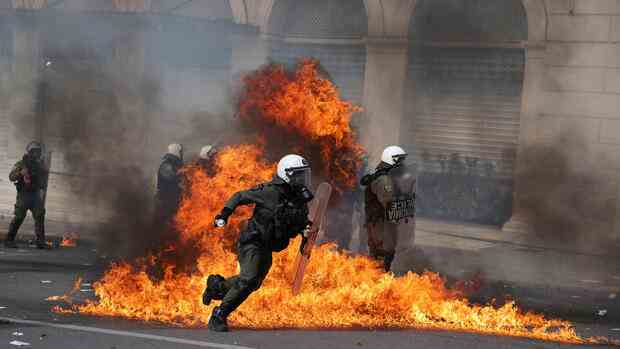Athens Greece does not come to rest. Since two weeks ago 57 people died in a head-on collision between two trains near the village of Tempi, there have been protests almost every day. On Thursday, the unions paralyzed the country with a general strike.
Public transport and air transport were particularly affected. All flights to and from Greece were cancelled. In Athens, Thessaloniki and other cities, tens of thousands took to the streets chanting “We will not forget, we will not forgive”. The demonstrators demanded a complete clarification of the circumstances that led to the accident.
The Tempi tragedy has changed the political landscape in Greece. The horror of the catastrophe and the sadness at the death of so many people are beginning to turn to anger. It is primarily aimed at the government. In a survey by the opinion research institute MRB on behalf of the television channel Open TV, 62 percent rated Prime Minister Kyriakos Mitsotakis’ crisis management negatively.
So far, the conservative prime minister, who has been in power for four years, has been considered a candidate for a second term. He hoped to defend his absolute majority in the parliamentary elections due in the spring. That has now become improbable.
In the latest polls, the governing party Nea Dimokratia (ND) has recorded severe losses. If the decline in the Mitsotakis party continues before the elections, the radical left opposition leader and ex-Prime Minister Alexis Tsipras could return to power.
“Tragic Human Error”
Mitsotakis initially attributed the accident to a “tragic human error”: A dispatcher had set an incorrect switch setting and sent an Intercity train coming from Athens with 350 passengers on a collision course with an oncoming freight train. The trains crashed into each other at high speed.
The Tempi tragedy has changed the political landscape in Greece.
(Photo: Reuters)
We now know that it wasn’t just human error. Broken light signals, antiquated technology, faulty safety systems: only three weeks before the disaster, railway unionists had described the abuses in a fire letter to the Minister of Transport and the railway company. “What are you waiting for to intervene? What else has to happen?” the letter said.
Transport Minister Kostas Karamanlis resigned the day after the accident. The safety deficiencies and omissions at the Greek railways are also the responsibility of previous governments.
>> Read here: Dead in train crash in Greece
But Mitsotakis has to be asked what he has done in the past four years to correct the mistakes – apparently nothing or at least not enough. The Greek prime minister has credit for his reform policies, especially digitization. But the situation on the railways is the same as it was 100 years ago: points are set by hand, trains are handed over by telephone from one station master to the next.
Mitsotakis has apologized
Meanwhile, Mitsotakis has taken to social media to apologize “both personally and on behalf of everyone who has ruled the country for years.” as he wrote on Twitter. But the anger mainly hits him and his party.
In a survey, 62 percent rated Prime Minister Kyriakos Mitsotakis’ crisis management negatively.
(Photo: AP)
For the first time in six years, the ND has slipped below the 30 percent mark in the MRB surveys. The lead over the left-wing alliance Syriza has shrunk from around eight to under three percentage points.
As a result, pollsters can no longer clearly predict which of the two parties will win the election. Syriza boss Tsipras could try to form a coalition with left-wing splinter parties such as the social democratic Pasok and the MeRa25 party of his former finance minister Yanis Varoufakis.
This is reminiscent of January 2015, when the debt crisis brought the left-wing alliance Syriza the election victory. Within six months, the Greek financial system was brought to the brink of collapse.
>> See the video here: Continued violent protests against the ailing rail network in Greece
In order to avert the threat of national bankruptcy, the euro partners had to put together a third rescue package. Now the train accident could bring new political and economic turbulence to Greece.
Meanwhile, Mitsotakis is playing for time. The election date must be in July at the latest, since that is when the legislative period in the country ends. However, April 9, which was previously mentioned as a possible election date, is no longer targeted due to the train accident. The head of government is likely to delay the elections for as long as possible in the hope that the anger of the voters at the state’s failure will have subsided somewhat by then.
More: Athens Stock Exchange on the up – Which stocks are recommended by analysts
